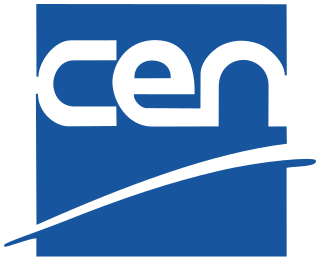The ISO 9000 family is a set of five quality management systems (QMS) standards by the International Organization for Standardization (ISO) that help organizations ensure they meet customer and other stakeholder needs within statutory and regulatory requirements related to a product or service. ISO 9000 deals with the fundamentals of QMS, including the seven quality management principles that underlie the family of standards. ISO 9001 deals with the requirements that organizations wishing to meet the standard must fulfill. ISO 9002 is a model for quality assurance in production and installation. ISO 9003 for quality assurance in final inspection and test. ISO 9004 gives guidance on achieving sustained organizational success.
ISO 14000 is a family of standards by the International Organization for Standardization (ISO) related to environmental management that exists to help organizations (a) minimize how their operations negatively affect the environment ; (b) comply with applicable laws, regulations, and other environmentally oriented requirements; and (c) continually improve in the above.

The European Committee for Standardization is a public standards organization whose mission is to foster the economy of the European Single Market and the wider European continent in global trading, the welfare of European citizens and the environment by providing an efficient infrastructure to interested parties for the development, maintenance and distribution of coherent sets of standards and specifications.
Information technology service management (ITSM) are the activities performed by an organization to design, build, deliver, operate and control information technology (IT) services offered to customers.
ISO/IEC 20000 is the international standard for IT service management. It was developed in 2005 by ISO/IEC JTC1/SC7 and revised in 2011 and 2018. It was originally based on the earlier BS 15000 that was developed by BSI Group.
European Standards, sometimes called Euronorm, are technical standards which have been ratified by one of the three European Standards Organizations (ESO): European Committee for Standardization (CEN), European Committee for Electrotechnical Standardization (CENELEC), or European Telecommunications Standards Institute (ETSI). All ENs are designed and created by all standards organizations and interested parties through a transparent, open, and consensual process.
ISO 13485Medical devices -- Quality management systems -- Requirements for regulatory purposes is a voluntary standard, published by International Organization for Standardization (ISO) for the first time in 1996, and contains a comprehensive quality management system for the design and manufacture of medical devices. The latest version of this standard supersedes earlier documents such as EN 46001 and EN 46002 (1996), the previously published ISO 13485, and ISO 13488.

The British Standards Institution (BSI) is the national standards body of the United Kingdom. BSI produces technical standards on a wide range of products and services and also supplies certification and standards-related services to businesses.
An environmental audit is a type of evaluation intended to identify environmental compliance and management system implementation gaps, along with related corrective actions. In this way they perform an analogous (similar) function to financial audits. There are generally two different types of environmental audits: compliance audits and management systems audits. Compliance audits tend to be the primary type in the US or within US-based multinationals.
An independent test organization is an organization, person, or company that tests products, materials, software, etc. according to agreed requirements. The test organization can be affiliated with the government or universities or can be an independent testing laboratory. They are independent because they are not affiliated with the producer nor the user of the item being tested: no commercial bias is present. These "contract testing" facilities are sometimes called "third party" testing or evaluation facilities.

ISO/TC 37 is a technical committee within the International Organization for Standardization (ISO) that prepares standards and other documents concerning methodology and principles for terminology and language resources.
A specification often refers to a set of documented requirements to be satisfied by a material, design, product, or service. A specification is often a type of technical standard.
EN 15038 is a withdrawn quality standard developed especially for translation services providers. The EN 15038 standard ensured the consistent quality of the service. In 2015, CEN withdrew EN 15038 and adopted ISO 17100 as a European standard.

Biodiesel has a number of standards for its quality.
The language industry is the sector of activity dedicated to facilitating multilingual communication, both oral and written. According to the European Commission's Directorate-General of Translation, the language industry comprises following activities: translation, interpreting, subtitling, dubbing, software and website globalisation, language technology tools development, international conference organisation, language teaching and linguistic consultancy.
ISO 50001Energy management systems - Requirements with guidance for use, is an international standard created by the International Organization for Standardization (ISO). It supports organizations in all sectors to use energy more efficiently through the development of an energy Management System. The standard specifies the requirements for establishing, implementing, maintaining and improving an energy management system, whose purpose is to enable an organization to follow a systematic approach in achieving continual improvement of energy performance, including energy efficiency, energy security, energy use and consumption.

The Cyprus Organisation for Standardisation, or CYS, is the national standardisation body of Cyprus, whose principal activity is the production of standards and the supply of standards-related services.
The Association of Translation Companies (ATC) is a professional membership association promoting language services in the United Kingdom and beyond. The ATC represents the interests of translation companies operating in the UK's expanding language services industry which is home to over 1,200 translation companies, is worth more than £1 billion and employs more than 12,000 people.
ISO 17100:2015 Translation Services-Requirements for Translation Services was published on May 1, 2015. It was prepared by the International Organization for Standardization's Technical Committee ISO/TC 37, Terminology and other language and content resources, Subcommittee SC 5, Translation, interpreting and related technology.




